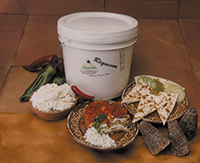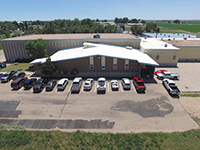 |
|||


|
 |


|
|

August 10, 2018 |
|||||||||
| New plant gives Queso Campesino ability to serve additional customers | |||||||||
By Kate Sander BRUSH, Colo. — Queso Campesino, which began cheese production in its new facility in Brush, Colorado, in 2017, is positioning itself for growth and looking for new customers and distributors who seek authentic Hispanic-style cheeses. Officially known as Colorado Ranchers Inc., the company is often known by its brand name, Queso Campesino, which can be translated as “working man’s cheese.” It is owned by managing partner Gabriel Robles, who has long specialized in Hispanic cheese, along with other investors. The cheese is available throughout the United States. Robles says his aim is to provide both Hispanic and Anglo consumers with high-quality, authentic Hispanic cheese and great customer service. He has worked long and hard to get to this point, and he is excited about the possibilities the company’s new plant affords. When the company was first founded in the 1990s, it briefly made Asadero, Queso Fresco and Menonita, a mild semi-firm cheese comparable to extra mild Gouda, in a small plant. For the rest of its cheese, the company contracted with producers throughout the United States and Mexico to market 13 other Mexican cheeses. Eventually, though, all of its cheeses were made by partners, and the company focused on marketing. “We took it as a challenge to go through the United States to cherry pick the best cheese,” Robles says.
“We’ve built the business a little differently,” adds Lynn Rimpley, vice president of sales and marketing. “Some companies start with the plant and move to the product, but we’ve focused on product, product, product, which is more important than the plant. The company focused on creating an image and procuring product with the right flavor.” With that mindset, the company has grown significantly under the leadership of Robles, who emigrated from Mexico in 1979. While some Hispanic cheese companies have focused on one ethnic segment of consumer or another, Robles has long thought that reaching consumers is simply about quality and not so much ethnicity. One of the things Robles says the company excels at is crossover between markets. It can equally serve small mom-and-pop Hispanic grocers as well as major retailers such as King Super, Whole Foods and Safeway. “All consumers have something in common,” he says. “You give them good quality and flavor, and it will meet their needs. There’s no magic about it.” By 2010, Robles had bought out his original partners and the Queso Campesino brand had grown to the point where owning its own manufacturing plant at least for some of its products made a lot of sense. Colorado Ranchers Inc. invested in a meat packaging plant in Brush, Colorado, and began the process of converting it into a cheese plant. As these things often go, the process of refurbishing the plant took longer than expected and the company began production there last year. At about the same time Robles bought out his original partners in 2010, he also partnered with Grupo Industrial Cuadritos in Celaya, Mexico, which currently supplies some of the company’s authentic Hispanic cheeses. Grupo Industrial Cuadritos makes a couple of the Queso Campesino brand cheeses, and it also sources hard-to-find Mexican product, Robles says. Trucks coming from Grupo Cuadritos directly supply Colorado Ranchers each week. While the current trade situation between Mexico and the United States has complicated things a bit, the relationship is successful and strong, Robles says, adding, “I really can’t complain.” Queso Campesino’s original sales emphasis was foodservice, catering to Mexican restaurants and small meat markets. The company in recent years has expanded to deli markets and, thanks to word of mouth, packaging for retail markets. Robles says a strength of the company is being able to serve small customers who other bigger companies might not be as interested in working with.
Robles says that won’t change as the new plant ramps up production. While the new plant gives the company more control, it is still relatively small, with a capacity to produce 60,000 pounds a day. As production is ramped up, it currently is producing cheese three days a week, he says. Queso Campesino’s business plan — making some of its cheese and partnering with others to make the rest — gives the company the ability to focus on quality, flavorful cheese made from high-grade pasteurized whole milk, Robles says. “We’re trying to do the right things, focusing on consistency, quality and service,” Robles says. The company’s cheeses are offered in bulk wheels, bolas, wedges and bars, random-weight cuts and exact-weight pieces. Its current product line covers the most popular items in the category, and new items are continually added as demand grows. The company will soon be adding some Central American-style cheeses under the Nina Toyita brand. “We see a lot of opportunities with this brand. Everybody knows Mexico, but there is less familiarity with countries like El Salvador,” says Rimpley, noting that the brand will initially be marketed to high-end retailers and foodservice. In addition to cheese, Colorado Ranchers offers yogurts, corn husks, pickled products, hams and other assorted Hispanic grocery items. It recently started marketing frozen tamales as well, and those have been especially popular, Robles says. As the company grows, Robles also is focused on developing a solid succession plan.
Colorado Ranchers is a family affair, with Robles’ brother Alejandro Robles involved in the grocery side of the business. In addition, Gabriel Robles’ son Nelson Robles is national director of sales, while son Abel runs the plant and daughter Gabriela is in company administration. However, the Robleses are quick to point out there isn’t nepotism. Nelson Robles says he and his siblings have been involved in the business from the ground up, starting with sweeping floors and picking orders as teens and learning different responsibilities as they grew older. Dedication to family and customers is important to the Robleses, and as an adult Nelson says he sees the value in the work his father had him do as a teen. With that experience, he says he is very comfortable in many aspects of the business and as a team they are excited about the growth prospects the future holds. “We will continue following our business plan and add to our business capabilities,” Gabriel Robles says. Colorado Ranchers has distribution throughout the United States, and it is always adding to its network, he says. Colorado Ranchers has outlet warehouses in Salt Lake City, Utah; Lincoln, Nebraska; Albuquerque, New Mexico; and Dallas, Texas. “Our model to go nationally is to team up with distributors that we can partner up with or invest in,” Robles says. In addition, the company currently is in the process of getting a website up and running, a project that has gone by the wayside a bit as the company has focused on the new plant and continuing to procure high-quality products. The Queso Campesino brand also plans to soon release a cookbook — which will be available online — that highlights the many different uses of the company’s cheeses. The company is hopeful that the bilingual cookbook will be a helpful resource for all consumers. “We’re a family business, always trying to do the right things with consistency, quality and service,” Robles adds. CMN
|
|||||||||
| CMN article search |
|
|
© 2025 Cheese Market News • Quarne Publishing, LLC • Legal Information • Online Privacy Policy • Terms and Conditions
Cheese Market News • Business/Advertising Office: P.O. Box 628254 • Middleton, WI 53562 • 608/831-6002
Cheese Market News • Editorial Office: 5315 Wall Street, Suite 100 • Madison, WI 53718 • 608/288-9090

